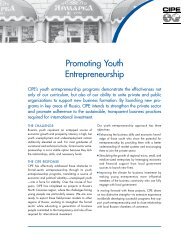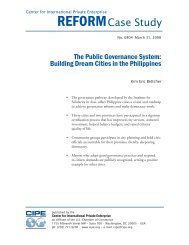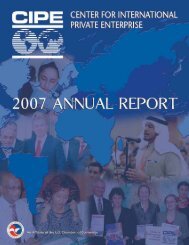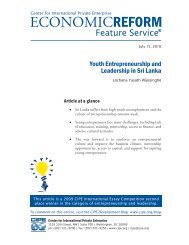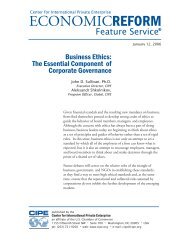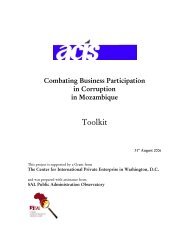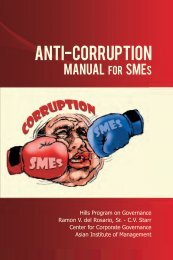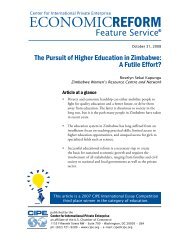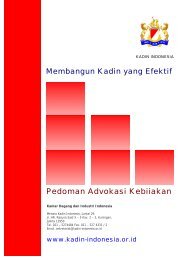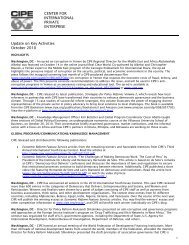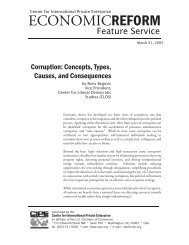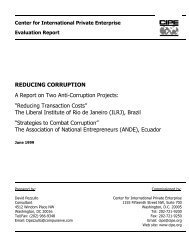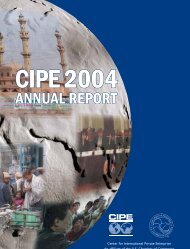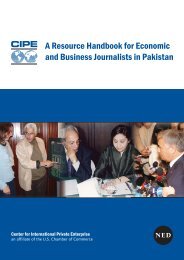Responsible Business Guide: A Toolkit for Winning Companies
Responsible Business Guide: A Toolkit for Winning Companies
Responsible Business Guide: A Toolkit for Winning Companies
Create successful ePaper yourself
Turn your PDF publications into a flip-book with our unique Google optimized e-Paper software.
RBG<br />
<strong>Responsible</strong> <strong>Business</strong> <strong>Guide</strong>: A <strong>Toolkit</strong> <strong>for</strong> <strong>Winning</strong> <strong>Companies</strong><br />
Time to Re-think <strong>Business</strong> models<br />
It is time that companies, particularly SMEs who think they are small or off the public radar,<br />
look at their way of doing business all over again. It is time to look at existing values,<br />
decision-making structures, and policies and practices not only from the perspective of<br />
owners but of stakeholder opinion and community image.<br />
What differentiates a responsible business from others? It comes down mainly to defining<br />
business strategies that clearly demonstrate that a company is committed to accountable<br />
decision-making when offering its products or services to the market. In a business strategy<br />
that changes in order to place responsibility at its core, everyone in the company must<br />
unlearn and re-learn. Everyone must see that they have a role in making their company<br />
a responsible company. This is perhaps the challenge of CSR today.<br />
Two examples immediately come to mind of companies thinking ahead of their time and<br />
actually trans<strong>for</strong>ming their business segment and consumer expectations with a strong<br />
ethical message. Both were ahead of their time, but saw spectacular success.<br />
The Body Shop, a British enterprise, became famous <strong>for</strong> its nature-based personal care<br />
products sourced from communities and sold in reusable bottles, an innovative idea<br />
bolstered by its principled positions on social and environmental issues such as animal<br />
testing, women and children rights, and protection of endangered species at a time when<br />
it was not fashionable. The company introduced direct community sourcing <strong>for</strong> its products,<br />
expanding from 15 to over 300 suppliers between 1976 and 2007. It set an example of<br />
self-accountability and “ethical consumerism” by opening up to independent social audits.<br />
By the time it was acquired by L’Oreal in 2006, The Body Shop had 2,000 retail outlets in<br />
61 countries, and owner Dame Anita Roddick had become synonymous with ethical<br />
entrepreneurship.<br />
The other example of trans<strong>for</strong>mational ethical entrepreneurship comes from Pakistan.<br />
Saga Sports was like any family-owned producer of hand-stitched footballs until it created<br />
a values-driven community production model. At a time when football companies were<br />
highlighted as poor examples of child labor and coercive work practices, Saga established<br />
village-based units producing quality footballs in compliance with international labor<br />
standards. In an industry perpetually at risk from a mobile, in<strong>for</strong>mal labor <strong>for</strong>ce and<br />
seasonal work, Saga created stability and up to 9,000 regular jobs by institutionalizing<br />
ethical values and a caring work environment. Initially resisted, its model workplaces and<br />
process efficiencies combined with verifiable product integrity are now the standard in<br />
Sialkot. Ironically, a violation of its own standards cost Saga its business in 2007.<br />
<strong>Responsible</strong> <strong>Business</strong> Initiative 13



